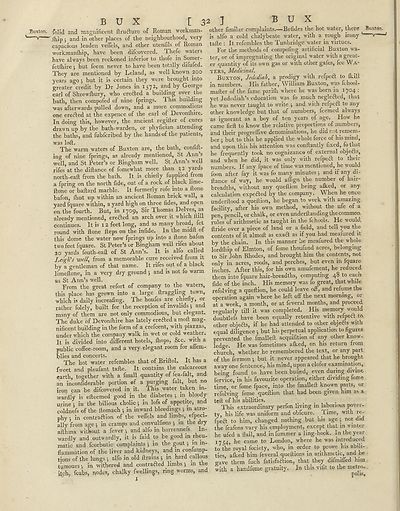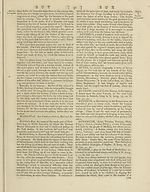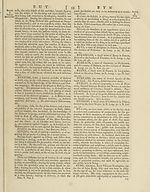Encyclopaedia Britannica, or, a Dictionary of arts, sciences, and miscellaneous literature : enlarged and improved. Illustrated with nearly six hundred engravings > Volume 5, BUR-CHI
(42) Page 32
Download files
Complete book:
Individual page:
Thumbnail gallery: Grid view | List view

B U X
Buxton, folid and magnificent ftruchire of Roman
fhip j an(i in other places of the neighbourhood, very
capacious leaden vefiels, and other utenfils of Roman
■workmanlhip, have been difcovered. Ihefe waters
have always been reckoned inferior to thofe in Somer-
fetfhire j but feem never to have been totally difufed.
They are mentioned by Leland, as well known 200
years ago •, but it is certain they were brought into
greater credit by Dr Jones in I572> an.^ ^ George
earl of Shrewlbury, who eretled a building over the
bath, then compofed of nine fprings. Ihis building
was afterwards pulled down, and a more commodious
one ere&ed at the expence of the carl of Devonlhire.
In doing this, however, the ancient regiiler of cures
drawn up by the bath-warden, or phyfician attending
the baths, and fubfcribed by the hands of the patients,
was loft.
The warm waters of Buxton are, the bath, connft-
ing of nine fprings, as already mentioned, St Ann’s
well, and St Peter’s or Bingham well. St Ann’s well
rifes at the diftance of fomewhat more than 3 2 yards
north-eaft from the bath. It is chiefly fupplied from
a fpring on the north fide, out of a rock of black lime-
ftone or baftard marble. It formerly rofe into a ftone
bafon, fliut up within an ancient Roman brick wall, a
yard fcjuare within, a yard high on three fides, and open
on the fourth. But, in 1709, Sir Thomas Delves, as
already mentioned, erefted an arch over it which ftill
continues. It is 12 feet long, and as many broad, fet
round with ftone fteps on the infide.. In the midft of
this dome the water now fprings up into a ftone bafon
two feet fquare. St Peter’s or Bingham well rifes about
20 yards fouth-eaft of St Ann’s. It is alfo called
Leigh's well, from a memorable cure received from it
by a gentleman of that name. It rifes out of a black
limeftone, in a very dry ground 5 and is not fo warm
as St Ann’s well.
From the great refort of company to the waters,
this place has grown into a large ftraggling town,
which is daily increafing. I he houfes are chiefly, or
rather folely, built for the reception of invalids j and
many of them are not only commodious, but elegant.
The duke of Devonlhire has lately ere&ed a moft mag¬
nificent building in the form of a crefcent, with piazzas,
under which the company walk in wet or cold weather.
It is divided into different hotels, {hops, &c. with a
public coffee-room, and a very elegant room for affem-
blies and concerts. .
The hot water refembles that of Briftol. It has a
fweet and pleafant tafte. It contains the calcareous
earth, together with a fmall quantity of fea-falt, and
an inconfiderable portion of a purging fait, but no
iron can be difcovered in it. This water taken in¬
wardly is efteemed good in the diabetes j in. bloody
urine ; in the bilious cholic *, in lofs of appetite, and
coldnefs of the ftomach ; in inward bleedings m atro¬
phy 5 in contraction of the veffels and limbs, efpeci-
ally from age *, in cramps and convulfions •, in the dry
afthma without a fever •, and alfo in barrenness. fn"
wardly and outwardly, it is faid to be good in jheu-
matic and fcorbutic complaints ; in the gout •, m in¬
flammation of the liver and kidneys, and in confump-
tions of the lungs *, alfo in old {trains j in hard callous
tumours*, in withered and contradted.limbs j m the
itch, fcabs, nodes, chalky fwellings, ring worms, and
X
[ 32 ] . 13 U X
workman- other fimilar complaints.—Befides the hot water, there
is alfo a cold chalybeate water, with a rough irony ~
tafte : It refembles the Tunbridge water in virtues.
For the methods of compofing artificial Buxton wa¬
ter, or of impregnating the original water with a great¬
er quantity of its own gas or with other gafes, fee Wa¬
ters, Medicinal.
Buxton, Jedcdiah, a prodigy with refpeCt to {kill
in numbers. His father, William Buxton, \vas fchool-
mafter of the fame parifli w here he was born in I7°4 ;
yet Jedediah’s education w'as fo much neglecled, that
he was never taught to write ^ and with relpeft to any
other knowledge but that of numbers, feemed alw'ays
as ignorant as a boy of ten years of age. Howr he
came firft to know the relative proportions of numbers,
and their progreflive denominations, he did not remem¬
ber ; but to this he applied the whole force of his mind,
and upon this his attention w as conftantly fixed, fo that
he frequently took no cognizance of external objeCls,
and when he did, it was only with refpeCl to their
numbers. If any {pace of time was mentioned, he would
foon after fay it was fo many minutes j and if any di¬
ftance of way, he would aflign the number of hair¬
breadths, without any queftion being alked, or any
calculation expeded by the company. When he once
underftood a queftion, he began to.work with amazing
facility, after his own method, without the ufe of a
pen, pencil, or chalk, or even underftanding the common
rules of arithmetic as taught in the fchools. He w'oukf
ftride over a piece of land or a field, and tell y°u the
contents of it almoft as exadf as if you had meafured it
the chain. In this manner ne meafured the whole
lordftiip of Elmton, of fome thoufand acres, belonging
to Sir John Rhodes, and brought him the contents, not
only in acres, roods, and perches, but even in fquare
inches. After this, for his own amufement, he reduced
them into fquare hair-breadths, computing 48 to each
fide of the inch. His memory was fo great, that while
refolving a queftion, he could leave off, and refume the
operation again where he left oft' the next morning, Oi
at a week, a month, or at feveral months, and proceed
regularly till it was completed. His memory would
doubtlefs have been equally retentive with refpea to
other objefts, if he had attended to other .objefts with
equal diligence j but his perpetual application to figures
prevented the fmalleft acquifition of any other know¬
ledge. He was fometimes afked, on his return from
church, whether he remembered the text, or any part
of the fermon j but it never appeared that he brought
away one fentence, his mind, upon a clofer examination,
being found to have been buiied, even during divine
fervice, in his favourite operation, either dividing fome
time, or fome fpace, into the fmalleft known parts, or
refolving fome queftion that had been given him as a
teft of his abilities. .
This extraordinary perfon living in laborious pover¬
ty, his life was uniform and obfeure. lime, with re-
fpeci to him, changed nothing but his age j nor did
the feafons vary his employment, except that in wdnter
he ufed a flail, and infummer a ling-hook. In the year
fie came to London, w'here he was introduced
to the royal fociety, who, in . order to prove, his abili¬
ties, alked him feveral queftions in arithmetic, and he
gave them fuch fatisfattion, that they difmiffed him
with a handfome gratuity. In this vifit to the metro,
polls,
Buxton,
Buxton, folid and magnificent ftruchire of Roman
fhip j an(i in other places of the neighbourhood, very
capacious leaden vefiels, and other utenfils of Roman
■workmanlhip, have been difcovered. Ihefe waters
have always been reckoned inferior to thofe in Somer-
fetfhire j but feem never to have been totally difufed.
They are mentioned by Leland, as well known 200
years ago •, but it is certain they were brought into
greater credit by Dr Jones in I572> an.^ ^ George
earl of Shrewlbury, who eretled a building over the
bath, then compofed of nine fprings. Ihis building
was afterwards pulled down, and a more commodious
one ere&ed at the expence of the carl of Devonlhire.
In doing this, however, the ancient regiiler of cures
drawn up by the bath-warden, or phyfician attending
the baths, and fubfcribed by the hands of the patients,
was loft.
The warm waters of Buxton are, the bath, connft-
ing of nine fprings, as already mentioned, St Ann’s
well, and St Peter’s or Bingham well. St Ann’s well
rifes at the diftance of fomewhat more than 3 2 yards
north-eaft from the bath. It is chiefly fupplied from
a fpring on the north fide, out of a rock of black lime-
ftone or baftard marble. It formerly rofe into a ftone
bafon, fliut up within an ancient Roman brick wall, a
yard fcjuare within, a yard high on three fides, and open
on the fourth. But, in 1709, Sir Thomas Delves, as
already mentioned, erefted an arch over it which ftill
continues. It is 12 feet long, and as many broad, fet
round with ftone fteps on the infide.. In the midft of
this dome the water now fprings up into a ftone bafon
two feet fquare. St Peter’s or Bingham well rifes about
20 yards fouth-eaft of St Ann’s. It is alfo called
Leigh's well, from a memorable cure received from it
by a gentleman of that name. It rifes out of a black
limeftone, in a very dry ground 5 and is not fo warm
as St Ann’s well.
From the great refort of company to the waters,
this place has grown into a large ftraggling town,
which is daily increafing. I he houfes are chiefly, or
rather folely, built for the reception of invalids j and
many of them are not only commodious, but elegant.
The duke of Devonlhire has lately ere&ed a moft mag¬
nificent building in the form of a crefcent, with piazzas,
under which the company walk in wet or cold weather.
It is divided into different hotels, {hops, &c. with a
public coffee-room, and a very elegant room for affem-
blies and concerts. .
The hot water refembles that of Briftol. It has a
fweet and pleafant tafte. It contains the calcareous
earth, together with a fmall quantity of fea-falt, and
an inconfiderable portion of a purging fait, but no
iron can be difcovered in it. This water taken in¬
wardly is efteemed good in the diabetes j in. bloody
urine ; in the bilious cholic *, in lofs of appetite, and
coldnefs of the ftomach ; in inward bleedings m atro¬
phy 5 in contraction of the veffels and limbs, efpeci-
ally from age *, in cramps and convulfions •, in the dry
afthma without a fever •, and alfo in barrenness. fn"
wardly and outwardly, it is faid to be good in jheu-
matic and fcorbutic complaints ; in the gout •, m in¬
flammation of the liver and kidneys, and in confump-
tions of the lungs *, alfo in old {trains j in hard callous
tumours*, in withered and contradted.limbs j m the
itch, fcabs, nodes, chalky fwellings, ring worms, and
X
[ 32 ] . 13 U X
workman- other fimilar complaints.—Befides the hot water, there
is alfo a cold chalybeate water, with a rough irony ~
tafte : It refembles the Tunbridge water in virtues.
For the methods of compofing artificial Buxton wa¬
ter, or of impregnating the original water with a great¬
er quantity of its own gas or with other gafes, fee Wa¬
ters, Medicinal.
Buxton, Jedcdiah, a prodigy with refpeCt to {kill
in numbers. His father, William Buxton, \vas fchool-
mafter of the fame parifli w here he was born in I7°4 ;
yet Jedediah’s education w'as fo much neglecled, that
he was never taught to write ^ and with relpeft to any
other knowledge but that of numbers, feemed alw'ays
as ignorant as a boy of ten years of age. Howr he
came firft to know the relative proportions of numbers,
and their progreflive denominations, he did not remem¬
ber ; but to this he applied the whole force of his mind,
and upon this his attention w as conftantly fixed, fo that
he frequently took no cognizance of external objeCls,
and when he did, it was only with refpeCl to their
numbers. If any {pace of time was mentioned, he would
foon after fay it was fo many minutes j and if any di¬
ftance of way, he would aflign the number of hair¬
breadths, without any queftion being alked, or any
calculation expeded by the company. When he once
underftood a queftion, he began to.work with amazing
facility, after his own method, without the ufe of a
pen, pencil, or chalk, or even underftanding the common
rules of arithmetic as taught in the fchools. He w'oukf
ftride over a piece of land or a field, and tell y°u the
contents of it almoft as exadf as if you had meafured it
the chain. In this manner ne meafured the whole
lordftiip of Elmton, of fome thoufand acres, belonging
to Sir John Rhodes, and brought him the contents, not
only in acres, roods, and perches, but even in fquare
inches. After this, for his own amufement, he reduced
them into fquare hair-breadths, computing 48 to each
fide of the inch. His memory was fo great, that while
refolving a queftion, he could leave off, and refume the
operation again where he left oft' the next morning, Oi
at a week, a month, or at feveral months, and proceed
regularly till it was completed. His memory would
doubtlefs have been equally retentive with refpea to
other objefts, if he had attended to other .objefts with
equal diligence j but his perpetual application to figures
prevented the fmalleft acquifition of any other know¬
ledge. He was fometimes afked, on his return from
church, whether he remembered the text, or any part
of the fermon j but it never appeared that he brought
away one fentence, his mind, upon a clofer examination,
being found to have been buiied, even during divine
fervice, in his favourite operation, either dividing fome
time, or fome fpace, into the fmalleft known parts, or
refolving fome queftion that had been given him as a
teft of his abilities. .
This extraordinary perfon living in laborious pover¬
ty, his life was uniform and obfeure. lime, with re-
fpeci to him, changed nothing but his age j nor did
the feafons vary his employment, except that in wdnter
he ufed a flail, and infummer a ling-hook. In the year
fie came to London, w'here he was introduced
to the royal fociety, who, in . order to prove, his abili¬
ties, alked him feveral queftions in arithmetic, and he
gave them fuch fatisfattion, that they difmiffed him
with a handfome gratuity. In this vifit to the metro,
polls,
Buxton,
Set display mode to:
![]() Universal Viewer |
Universal Viewer | ![]() Mirador |
Large image | Transcription
Mirador |
Large image | Transcription
Images and transcriptions on this page, including medium image downloads, may be used under the Creative Commons Attribution 4.0 International Licence unless otherwise stated. ![]()
| Permanent URL | https://digital.nls.uk/192984815 |
|---|
| Attribution and copyright: |
|
|---|
| Description | Ten editions of 'Encyclopaedia Britannica', issued from 1768-1903, in 231 volumes. Originally issued in 100 weekly parts (3 volumes) between 1768 and 1771 by publishers: Colin Macfarquhar and Andrew Bell (Edinburgh); editor: William Smellie: engraver: Andrew Bell. Expanded editions in the 19th century featured more volumes and contributions from leading experts in their fields. Managed and published in Edinburgh up to the 9th edition (25 volumes, from 1875-1889); the 10th edition (1902-1903) re-issued the 9th edition, with 11 supplementary volumes. |
|---|---|
| Additional NLS resources: |
|

